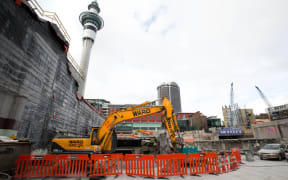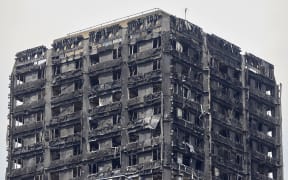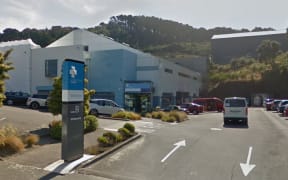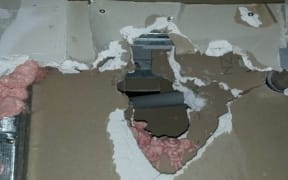The government is being too slow to introduce new regulations and policing measures on building supplies, the National Party says, as SkyCity announced its convention centre would be further delayed by the replacement of flammable panels.
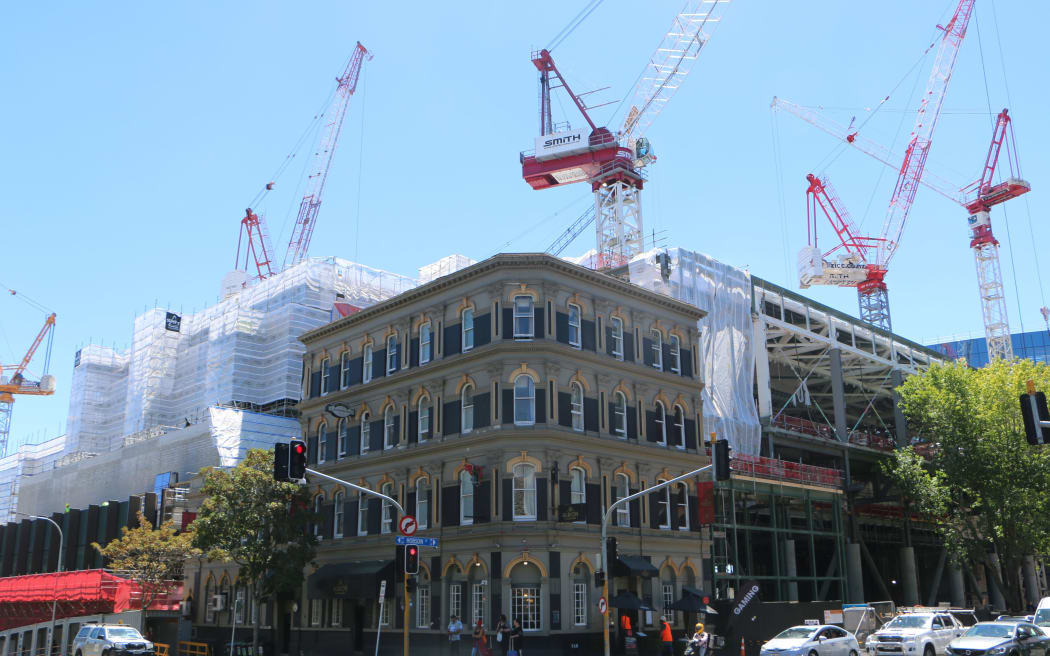
SkyCity Convention Centre construction Photo: RNZ/ Brooke Jenner
SkyCity is replacing panels similar to those used on Grenfell, at the international convention centre being built in Auckland.
The government is moving to overhaul the building supply system which remains beset by doubts about product safety, quality and the substitution of good products with cheaper ones.
An overhaul has not come soon enough for SkyCity and its contractor Fletcher Building at the badly delayed centre in Hobson Street.
"Following concerns raised around risks associated with Aluminium Composite Panel used on many building facades, a decision has been taken to replace all ACP on the NZICC [convention centre] at an additional cost of around $25m," SkyCity said in a statement.
ACP with a combustible core fuelled the rapid spread of the Grenfell fire in London in 2017.
Other types of less combustible panel are allowed on high-rises here.
The SkyCity case showed there was confusion and the government needed to follow Australia's clear lead, where ministers had just announced a wider ban on combustible cladding, said the National Party's construction spokesperson Andrew Bayly.
"It doesn't matter whether SkyCity or Fletchers pick it up, it's a helluva lot of money and there needs to be greater certainty around it so people don't make similar mistakes," Mr Bayly said.
"It's a lot of money to blow."
The wider problem of trying to track and verify that safe and durable building products are being used where they should be, and aren't swapped for cheaper substitutes, remains a problem.
The Ministry of Business Innovation and Employment is aiming to crack that, as part of what it says is "the biggest change to the building regulations since the Building Act was introduced in 2004".
Bruce Kohn of the Building Industry Federation, which represents many suppliers, believes it just might crack it.
"The difference this time is that we have been engaged at an early stage in consultation with the MBIE teams," Mr Kohn said.
"These people were eager to learn what we proposed."
The technology exists to put chips in all products that could be scanned on site to prove what they are and that they have passed the right tests.
GS1, a not-for-profit agency that developed the barcode, said technology was not the problem.
"It's more of a collective action problem where if the right parties came around the table and joined hands, this kind of information could be stood up very quickly in New Zealand," GS1 manager Nick Allison said.
But that meant getting consensus among thousands of suppliers and retailers, he said.
MBIE said it had given advice about building product assurance and regulations to the building minister, and that Cabinet would be asked to release a public consultation document on ways to change the system.
"We just need to get on top of this," National's Andrew Bayly said.
"We need products that are fit for purpose and we need a ministry that's actually acting. How much longer do we need to have a talkfest on it?"
A 2017 industry report estimated an electronic tracing system, if it cut down use of substandard building products by a third, would save the country $23m a year and boost safety.

